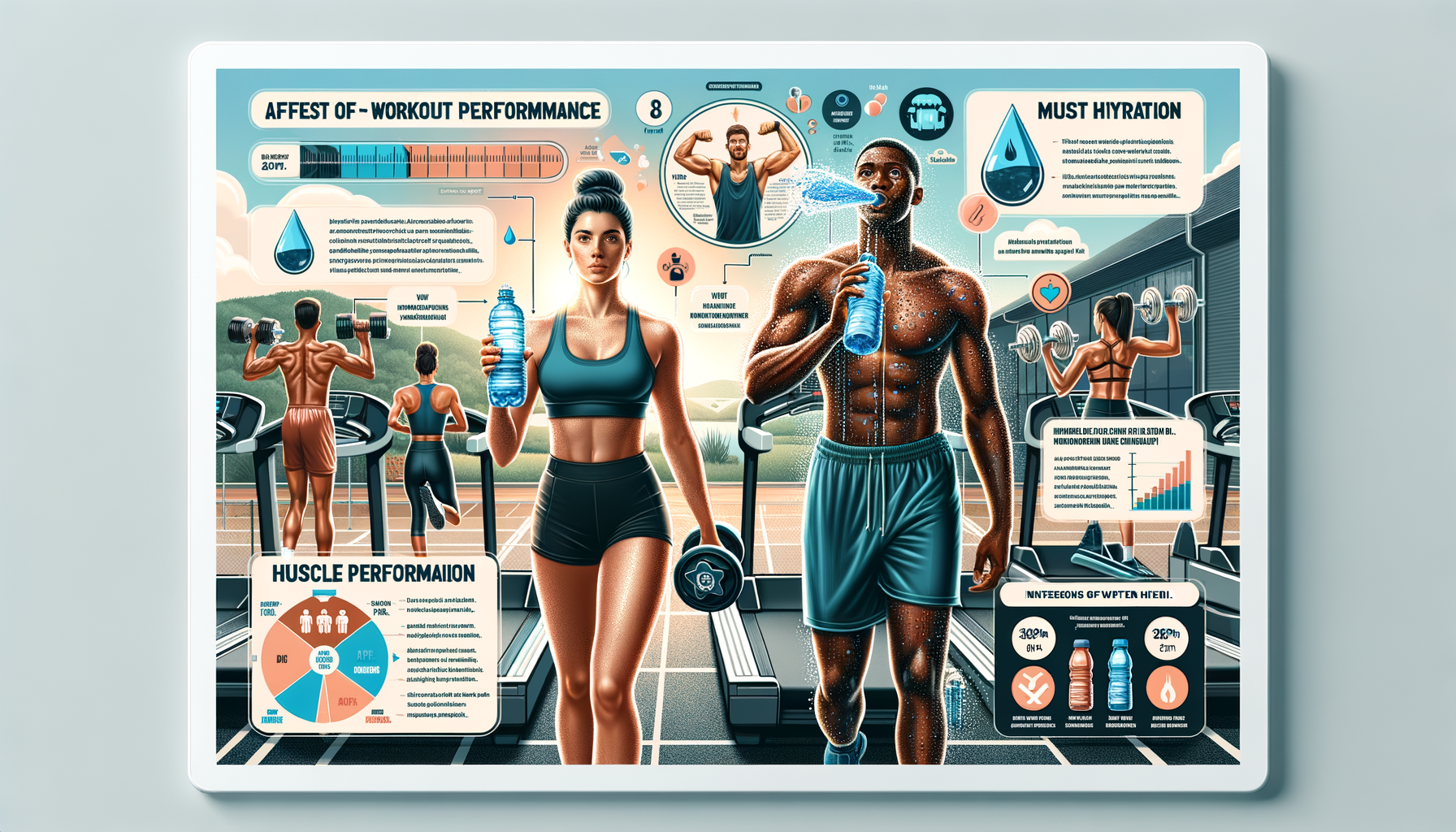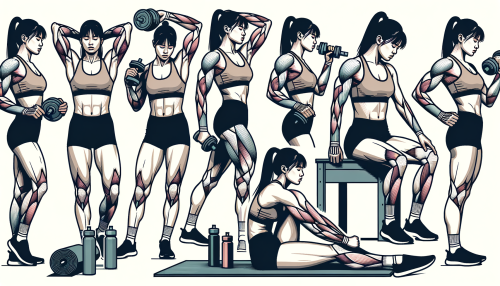Introduction
The impact of hydration on workout performance is a critical aspect of physical health and fitness that often goes unnoticed. Hydration plays a pivotal role in how the body functions during physical exertion, influencing everything from muscle function to cardiovascular health. Lack of adequate hydration can lead to decreased strength, stamina, and overall performance, making it harder for individuals to reach their fitness goals. This introduction will delve into the importance of maintaining proper hydration levels before, during, and after workouts, and the profound effects it can have on enhancing athletic performance and recovery.
Understanding the Role of Hydration in Enhancing Workout Performance

Hydration is a crucial element that often gets overlooked when it comes to workout performance. Whether you’re a seasoned athlete or a fitness newbie, understanding the role of hydration in enhancing your workout performance can significantly improve your overall fitness journey.
Let’s start with the basics. Our bodies are made up of about 60% water, which plays a vital role in maintaining our overall health. It aids in digestion, absorption, circulation, creation of saliva, transportation of nutrients, and maintenance of body temperature. When we exercise, we lose water through sweat, and if this water isn’t replaced, it can lead to dehydration, which can severely impact our workout performance.
Dehydration can lead to a myriad of issues, including muscle fatigue, loss of coordination, and a decrease in the body’s ability to regulate heat, all of which can negatively affect your workout. It can also make the workout feel much more challenging, both physically and mentally. Even a mere 2% loss of body water can lead to a noticeable decrease in physical and mental performance.
Now, let’s delve into how staying hydrated can enhance your workout performance. First and foremost, hydration helps maintain your body’s balance of fluids. These fluids aid in the digestion of food, absorption of nutrients, circulation of blood, and maintenance of body temperature. When you’re well-hydrated, your heart can more efficiently pump blood through your blood vessels to your muscles. As a result, your muscles work more efficiently, and your workout performance improves.
Hydration also plays a significant role in preventing muscle cramps and lubricating the joints. When you’re dehydrated, your muscles can cramp, making it difficult to perform exercises and potentially leading to injuries. On the other hand, staying hydrated helps keep your joints lubricated, reducing the risk of injury and allowing you to perform at your best.
Moreover, hydration can impact your post-workout recovery. After a strenuous workout, your body needs to replenish the fluids lost through sweat. Drinking water helps in the recovery process by transporting nutrients to your muscles, which aids in their repair and growth.
So, how much should you drink to stay hydrated? While the amount can vary based on factors like your weight, the intensity of your workout, and the climate, a general rule of thumb is to drink at least 8-10 glasses of water per day. However, during intense workouts or hot weather, you may need to increase your water intake.
In conclusion, hydration plays a pivotal role in enhancing your workout performance. It helps maintain your body’s balance of fluids, prevents muscle cramps, lubricates your joints, and aids in post-workout recovery. So, the next time you hit the gym, don’t forget to carry a water bottle with you. Remember, staying hydrated is just as important as the workout itself. So, drink up and power through your workout like a champ!
The Impact of Dehydration on Your Exercise Efficiency
Hydration is a crucial element that often gets overlooked when it comes to workout performance. It’s easy to focus on the more visible aspects of exercise, like strength training or cardio, but the truth is, the amount of water you drink can have a significant impact on your overall fitness results. This is because water plays a vital role in nearly every bodily function, including those that are essential for exercise efficiency.
Let’s dive into the impact of dehydration on your exercise efficiency. Dehydration occurs when your body loses more fluids than it takes in. This can happen quickly during a workout, especially if you’re exercising in hot weather or pushing yourself particularly hard. When you’re dehydrated, your body doesn’t have enough water to carry out its normal functions, and this can have a direct impact on your workout performance.
One of the first things you might notice when you’re dehydrated is a decrease in energy. Water is essential for the production of energy in your body. Without enough water, your body has to work harder to produce the same amount of energy, which can leave you feeling tired and sluggish. This can make it harder to push yourself during your workout, which can ultimately lead to less effective workouts and slower progress towards your fitness goals.
Dehydration can also affect your body’s ability to regulate its temperature. When you exercise, your body produces heat, and it relies on the water in your sweat to help cool you down. If you’re dehydrated, you might not be able to sweat as much as you need to, which can lead to overheating. This can not only make your workout feel harder, but it can also increase your risk of heat-related illnesses like heat stroke.
Another way dehydration can impact your workout performance is by affecting your mental clarity. Even mild dehydration can cause symptoms like confusion, difficulty concentrating, and mood changes. This can make it harder to stay focused during your workout, which can affect your form and potentially increase your risk of injury.
Finally, dehydration can also affect your body’s ability to recover after a workout. Water is essential for the repair and growth of muscle tissue, and without enough water, this process can be slowed down. This can lead to longer recovery times, which can interfere with your workout schedule and slow down your progress.
So, how can you ensure you’re staying properly hydrated? The amount of water you need can vary depending on a variety of factors, including your weight, the intensity of your workout, and the climate you’re exercising in. However, a good rule of thumb is to drink at least half your body weight in ounces of water each day. For example, if you weigh 150 pounds, you should aim to drink at least 75 ounces of water each day. It’s also a good idea to drink water before, during, and after your workout to help replace the fluids you lose through sweat.
In conclusion, staying hydrated is an essential part of maintaining your workout performance and overall health. By ensuring you’re drinking enough water, you can help your body function at its best, which can lead to more effective workouts and faster progress towards your fitness goals. So, the next time you hit the gym, don’t forget to bring your water bottle!
Maximizing Your Fitness Routine: The Importance of Proper Hydration
When it comes to maximizing your fitness routine, there’s one crucial element that often gets overlooked: proper hydration. You might be surprised to learn that staying hydrated is just as important as the exercises you perform or the nutritious food you consume. In fact, hydration can significantly impact your workout performance, and understanding this relationship can help you reach your fitness goals more effectively.
Let’s start with the basics. Our bodies are made up of about 60% water, which plays a vital role in maintaining our overall health. It aids in digestion, regulates body temperature, lubricates joints, and even helps transport nutrients to give you energy. When you exercise, you lose water through sweat, and if that lost fluid isn’t replaced, it can lead to dehydration. This is where the importance of hydration comes into play.
Dehydration during a workout can lead to a variety of negative effects. These include fatigue, dizziness, and muscle cramps, all of which can hinder your performance and make your workout feel much harder than it should. On the other hand, being well-hydrated can enhance your performance. It can increase your endurance, reduce the chance of injury, and help you recover faster after your workout.
Now, you might be wondering, “How much should I drink to stay hydrated?” Well, the answer isn’t as straightforward as you might think. The amount of water you need can depend on several factors, including the intensity of your workout, the climate, and your body size. However, a general rule of thumb is to drink at least eight 8-ounce glasses of water a day. If you’re exercising, you should increase this amount to compensate for the extra water loss.
But don’t wait until you’re thirsty to take a drink. Thirst is a sign that your body is already dehydrated. Instead, make it a habit to sip water throughout the day and especially before, during, and after your workout. If you’re planning a long, intense workout, consider a sports drink that can replace the electrolytes you lose through sweat.
Remember, hydration isn’t just about the quantity of water you drink, but also the timing. Drinking too much water right before or during your workout can lead to discomfort and even a condition called hyponatremia, where your body’s sodium levels become dangerously low. So, it’s best to hydrate gradually throughout the day.
In conclusion, proper hydration is a key component of a successful fitness routine. It can enhance your performance, prevent injuries, and help you recover faster. So, the next time you lace up your sneakers for a workout, make sure you have a water bottle in hand. After all, staying hydrated is not just about quenching your thirst, it’s about fueling your body for optimum performance. So, drink up and power through your workout like never before!
Conclusion
In conclusion, hydration significantly impacts workout performance. Adequate water intake before, during, and after exercise is essential for maintaining optimal body function. Dehydration can lead to decreased strength, endurance, and coordination, negatively affecting workout performance. Therefore, maintaining proper hydration levels is crucial for achieving fitness goals and ensuring overall health.





